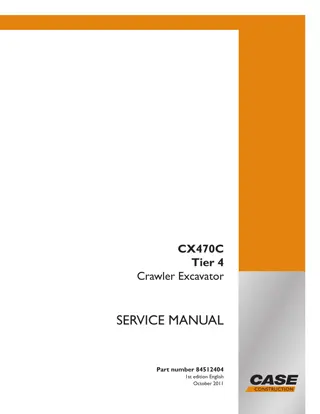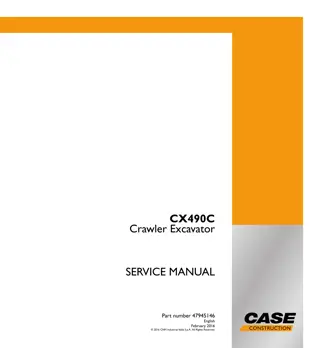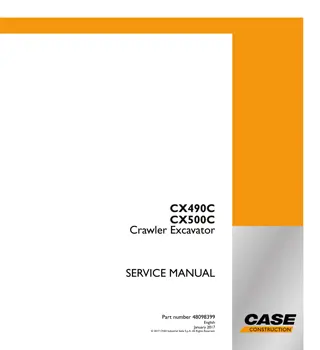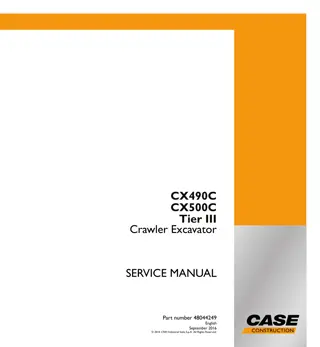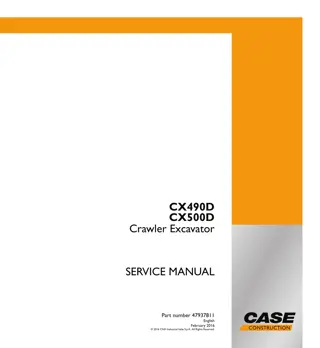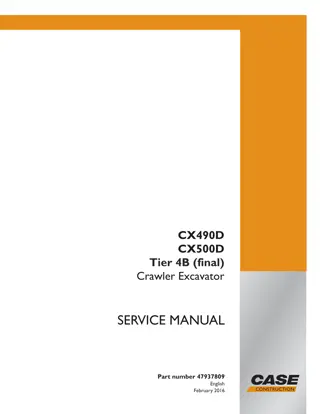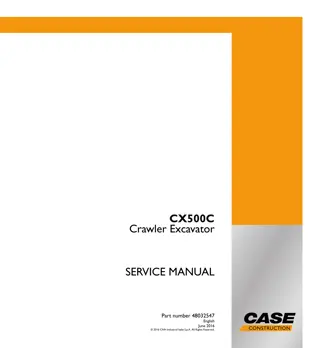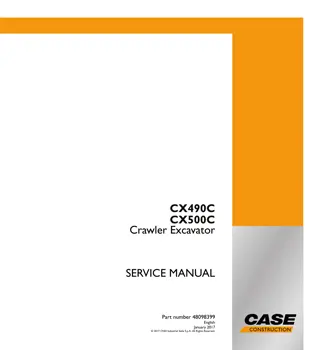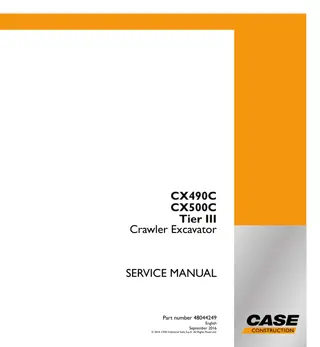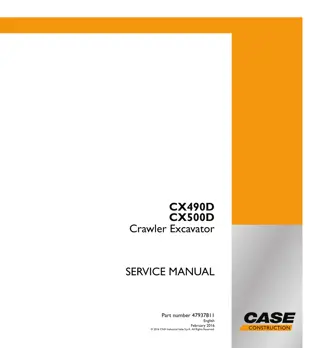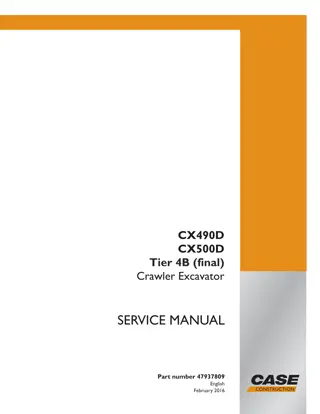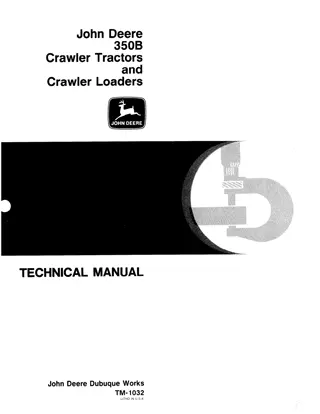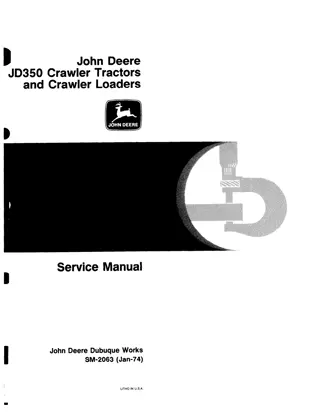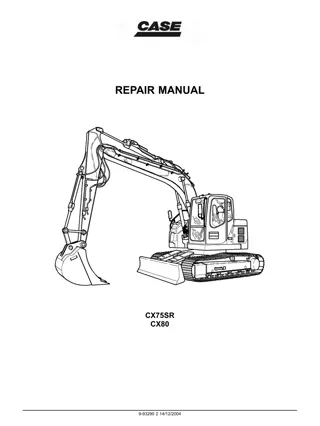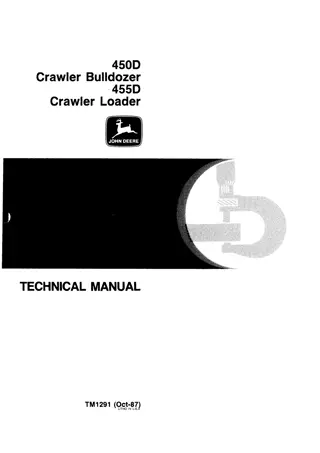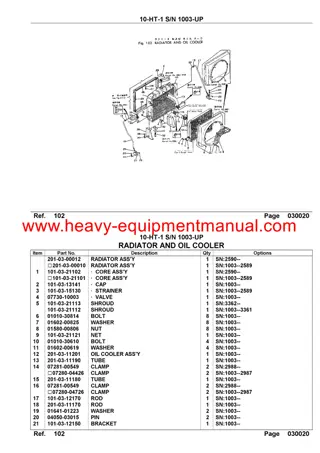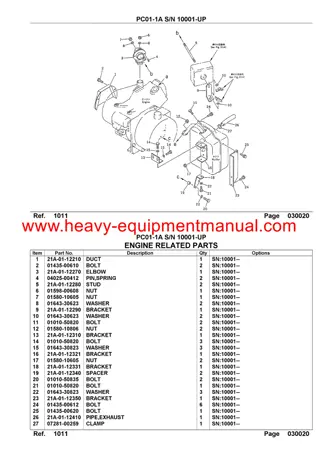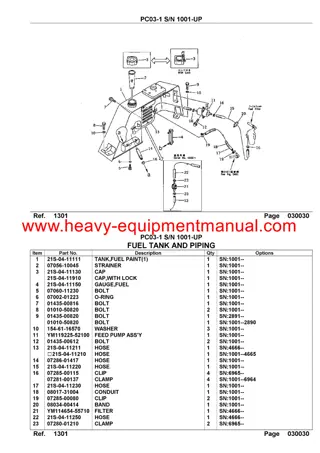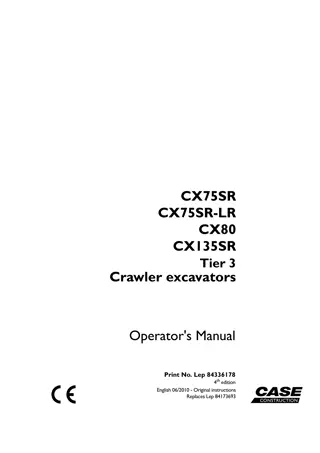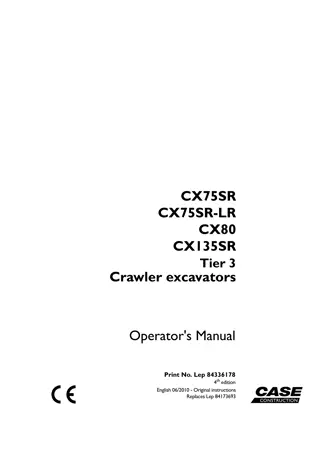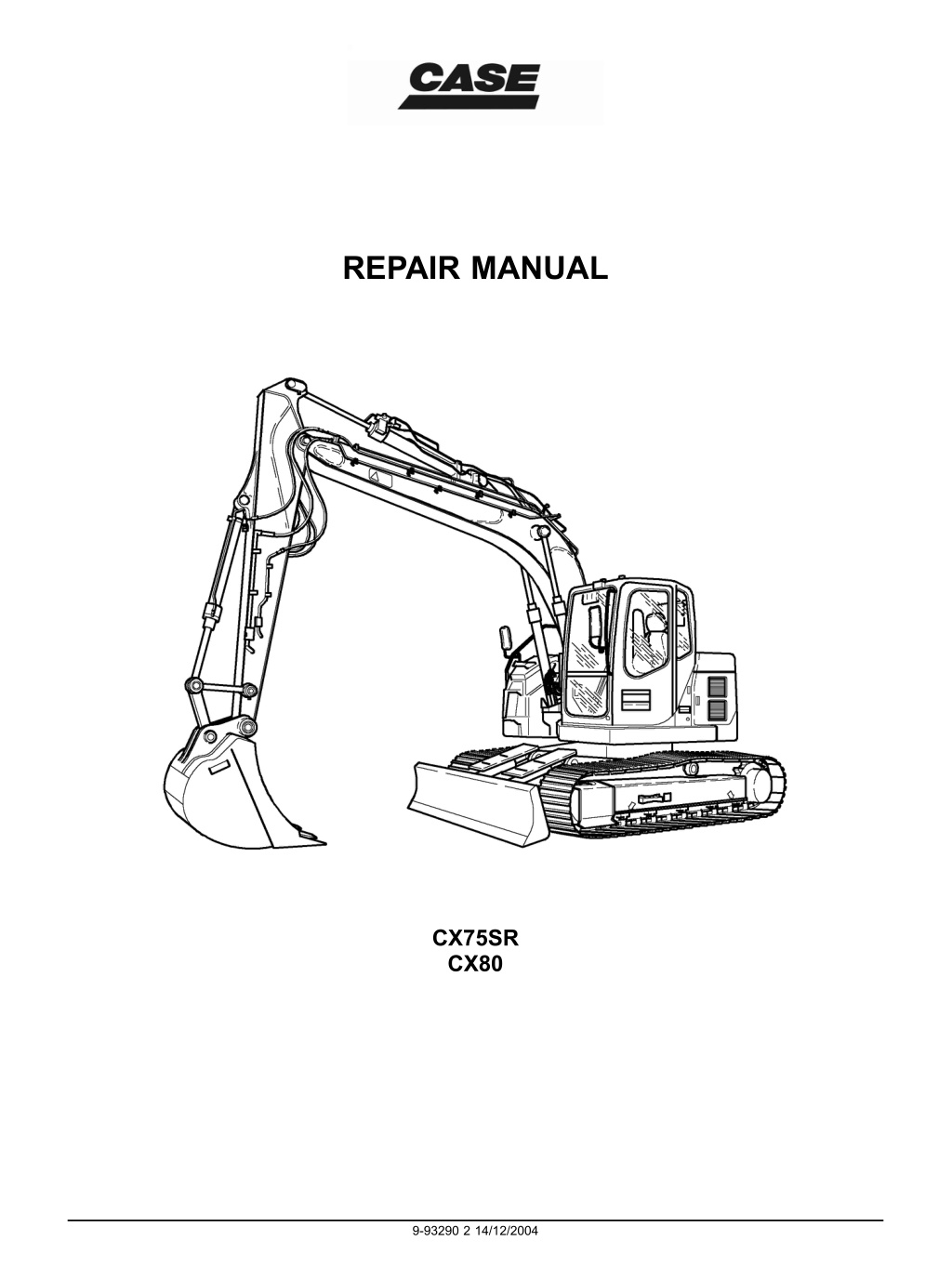
CASE CX75SR CRAWLER EXCAVATOR Service Repair Manual Instant Download
Please open the website below to get the complete manualnn//
Download Presentation

Please find below an Image/Link to download the presentation.
The content on the website is provided AS IS for your information and personal use only. It may not be sold, licensed, or shared on other websites without obtaining consent from the author. Download presentation by click this link. If you encounter any issues during the download, it is possible that the publisher has removed the file from their server.
E N D
Presentation Transcript
REPAIR MANUAL CX75SR CX80 9-93290 2 14/12/2004
Contents INTRODUCTION DISTRIBUTION SYSTEMS POWER PRODUCTION TRAVELLING BODY AND STRUCTURE FRAME POSITIONING WORKING ARM TOOLS AND COUPLERS A B D E F H J 9-93290 2 14/12/2004
INTRODUCTION 9-93290 2 14/12/2004 1
https://www.ebooklibonline.com Hello dear friend! Thank you very much for reading. Enter the link into your browser. The full manual is available for immediate download. https://www.ebooklibonline.com
Contents INTRODUCTION Foreword ( - A.10.A.40) CX75SR, CX80 Safety rules ( - A.50.A.10) CX75SR, CX80 Basic instructions ( - A.90.A.05) CX75SR, CX80 Torque ( - A.90.A.10) CX75SR Torque ( - A.90.A.10) CX80 Dimension ( - A.92.A.30) CX75SR Dimension ( - A.92.A.30) CX80 Weight ( - A.92.A.40) CX75SR Weight ( - A.92.A.40) CX80 Consumables ( - A.92.A.55) CX75SR, CX80 Hydraulic contamination ( - A.92.A.60) CX75SR, CX80 Product identi cation ( - A.80.A.10) CX75SR WE, CX80 WE Product identi cation ( - A.80.A.10) CX75SR NA, CX80 NA 3 4 6 7 10 13 15 17 18 19 22 24 25 9-93290 2 14/12/2004 2
INTRODUCTION Foreword ( - A.10.A.40) CX75SR, CX80 INTRODUCTION TO THE REPAIR MANUAL This manual has been designed so that in the near future it can be made available on CD and in a database via a computer network. This will allow fast and targeted search and navigation between the various information modules. Information search 1 CRIL03J033E01 This manual is organised according to types of function and information. The function and information types are codi ed and appear in parentheses after the title and separated by a dash: (1) Function (2) Information type. Only the rst letter (A) and the rst number (B) of the function need to be used for the information search. The rst letter (A) corresponds to the sections of the repair manual. The rst number (B) corresponds to the chapters of the repair manual. The rst part of the (A.B) code is re ected in the page numbering. THE REST OF THE CODING IS NOT LISTED IN ALPHA-NUMERIC ORDER IN THIS MANUAL. You will nd a table of contents at the beginning and end of each section and chapter. You will nd an alphabetical index at the end of each chapter. Therefore it is the rst part of the (A.B) coding, then the tables of contents and index (page numbers) which will allow you to quickly nd the information you are looking for. 9-93290 2 14/12/2004 3
INTRODUCTION Safety rules ( - A.50.A.10) CX75SR, CX80 CAUTION M171C - THIS SAFETY ALERT SYMBOL INDICATES IMPORTANT SAFETY MESSAGES IN THIS MANUAL. WHEN YOU SEE THIS SYMBOL, CAREFULLY READ THE MESSAGE THAT FOLLOWS AND BE ALERT TO THE POSSIBILITY OF DEATH OR SERIOUS INJURY. ATTENTION: To avoid injury, always observe the Safety Notices, CAUTION and ATTENTION, contained in this section and throughout the manual. Place a Do not start the machine warning notice on the starter switch key before all maintenance or repair operations. CAUTION M489 - Read the operators manual to familiarize yourself with the correct control functions. CAUTION M490 - Operate the machine and equipment controls from the seat position only. Any other method could result in serious injury. CAUTION M265A - A frequent cause of personal injury or death is persons falling off and being run over. Do not permit anyone to ride on the machine. CAUTION SB055 - Before starting engine, study operators manual safety messages. Read all safety signs on machine. Clear the area of other persons. Learn and practice safe use of controls before operation. It is your responsibility to understand and follow manufacturers instructions on machine operation, service, and to observe pertinent laws and regulation. Operators and service manuals can be obtained from your dealer. ATTENTION: You risk injury if you wear loose clothing or if you do not use safety equipment for your work. Always wear clothes which are unlikely to become caught in the machinery. Other safety equipment may be required, in particular: hard hat, safety boots, ear protectors, safety goggles or mask, thick gloves and re ective clothing. CAUTION M124A - Rotating machine parts, stay clear, keep shields installed to help protect from clothing entanglement and injury. Wear close- tted clothing. CAUTION SB071 - Rotating fan and belts: Contact will cause injury. Keep clear. ATTENTION: Follow the procedures exactly when carrying out checks or inspections on the vehicle s hydraulic systems. DO NOT CHANGE the procedures. ATTENTION: Before running the hydraulic cylinders in this vehicle through the cycles necessary for checking their functioning or for draining a circuit, warn people nearby to move away. 9-93290 2 14/12/2004 4
INTRODUCTION CAUTION SM121A - Always wear heat protective gloves to prevent burning your hands when handling heated parts. CAUTION M132B - Lower or block elevated implements and other attachments before servicing or when leaving the equipment. CAUTION R149C - Hydraulic oil or diesel fuel leaking under pressure can penetrate the skin and cause infection or other injury. To Prevent Personal Injury: Relieve all pressure, before disconnecting uid lines or performing work on the hydraulic system. Before applying pressure, make sure all connections are tight and components are in good condition. Never use your hand to check for suspected leaks under pressure. Use a piece of cardboard or wood for this purpose. If injured by leaking uid, see your doctor immediately. ATTENTION: To remove a hardened pin, such as a pivot pin, or a hardened shaft, use a soft-headed hammer (brass or bronze) or a brass or bronze peg and a steel-headed hammer. CAUTION M428 - Always wear safety glasses when using a drill, hammer, saw, or other tools that may cause chips to y. ATTENTION: Use suitable servicing jacks or a chain hoist for raising the wheels or tracks. Always chock the vehicle in place with suitable safety supports. ATTENTION: When carrying out maintenance or repair operations on the vehicle, keep the workshop oor, the driving position and the steps free from oil, water, grease, tools, etc... Use an oil absorbent material and/or workshop cloths as necessary. Always use sound methods. ATTENTION: Some parts of this vehicle are very heavy. Use lifting devices or additional assistance recommended in the Operator s Manual. CAUTION M532 - Do not operate the engine in a closed building. Proper ventilation is required under all circumstances. CAUTION M503 - When the battery electrolyte is frozen, the battery can explode if (1), you try to charge the battery, or (2), you try to jump start and run the engine. To prevent the battery electrolyte from freezing, try to keep the battery at full charge. If you do not follow these instructions, you or others in the area can be injured. CAUTION M244A - BATTERIES CONTAIN ACID AND EXPLOSIVE GAS. EXPLOSION CAN RESULT FROM SPARKS, FLAMES, OR WRONG CABLE CONNECTIONS. TO CONNECT JUMPER CABLES OR CHARGER, SEE MANUAL(S) FOR THE CORRECT PROCEDURE. FAILURE TO FOLLOW THE ABOVE INSTRUCTIONS CAN CAUSE SERIOUS PERSONAL INJURY OR DEATH. 9-93290 2 14/12/2004 5
INTRODUCTION Basic instructions ( - A.90.A.05) CX75SR, CX80 GENERAL Cleaning Clean all metal parts except the bearings with white spirit or steam. Do not use caustic soda for steam cleaning. After each cleaning, dry and oil all parts. Clean the oil ducts with compressed air. Clean the bearings with paraf n, then dry them completely and lubricate them. Inspection Check all the parts when they are disassembled. Replace all parts that show signs of wear or damage. Super cial scratches and grooves can be removed with an oil stone or with a cloth dipped in red oxide. A complete visual inspection is necessary to detect wear and pitting, and replacing parts as soon as it becomes necessary will help to avoid premature breakdowns. Bearings Check that the bearings turn freely. Replace them if their adjustment is too free or if their functioning is irregular. Wash the bearings with a good solvent or paraf n and allow them to air dry. DO NOT DRY THE BEARINGS WITH COMPRESSED AIR. Needle bearings Before pushing needle bearings into a cylinder bore, always remove all metallic projections from the bore and its edges. Before pushing in bearings with a press, coat the inside and edges of the bearings with Vaseline. Gears Check all the gears and ensure that they do not show any signs of wear or damage. Replace the worn out or damaged gears. Gaskets, O-rings and at seals Always install new gaskets, O-rings, and at seals. Coat the gaskets and O-rings with Vaseline. Shaft Check all shafts showing wear or damage. Enusre that the surface of a shaft carrying a bearing or gasket is not damaged. Spare parts Always use CASE spare parts. To order these, refer to the Spare Parts Catalogue and indicate the correct reference number of the CASE spare parts. Breakdowns caused by the use of parts other than CASE spare parts are not covered by the warranty. Lubrication Use only the oils and lubricants speci ed in the Operator s Manual or the Service Manual. Breakdowns caused by the use of oils and lubricants not speci cally listed are not covered by the warranty. 9-93290 2 14/12/2004 6
INTRODUCTION Torque ( - A.90.A.10) CX75SR Order of tightening nuts and cap screws. Tighten alternately so that torque setting remains even. Cap screws which are tted with Loctite (look for traces of a white residue on the thread after removal), must be cleaned with a thin oil or a suitable solvent, then dried. Add two or three drops of Loctite to the cap screw thread, then t the screw. 1 CRIL03H012E01 The numbers in the diagrams represent the order of tightening. Tightening torque Where there are no special instructions, tighten cap nuts screws to the torques given in the table below. Standard torque setting table. Designation of cap screws (dimensions) Cap screw M6 M8 M10 M12 M14 M16 M18 M20 Wrench in mm Torque setting in Nm Wrench in mm Torque setting in Nm 10 6,9 13 19,6 17 39,2 19 58,8 22 98,1 24 157,2 27 196 30 274 5 8,8 6 21,6 8 42,1 10 78,4 12 117,6 14 176,4 14 245 17 343 Socket head screw SPECIAL TORQUE SETTINGS No. Wrench in mm 24 22 17 24 30 22 36 24 24 24 17 19 17 Hex 19 17 Tightening torque Component Screw diameter M16 M14 M10 M16 M20 M14 M24 M16 M16 M16 M10 M12 M10 M12 M12 M10 Travel moto-reduction gear Sprocket Idler wheel Upper roller Lower roller Track pad Counterweight Turntable bearing (chassis and upperstructure) Swing moto-reduction gear Engine Engine mounts Radiator Hydraulic pump Hydraulic pump support Hydraulic reservoir Fuel tank 267 - 312 Nm 173 - 202 Nm 63 - 73 Nm 267 - 312 Nm 521 - 608 Nm 220 - 270 Nm 850 - 992 Nm 252 - 283 Nm 267 - 312 Nm 265 - 313 Nm 64 - 74 Nm 36 - 44 Nm 64 - 74 Nm 109 - 126 Nm 69 - 78 Nm 36 - 44 Nm (1)* (2)* (3)* (4)* (5)* (6) (7) (8) (9)* (10)* (11)* (12) (13)* (14)* (15)* (16)* 9-93290 2 14/12/2004 7
INTRODUCTION No. Wrench in mm 19 17 24 Tightening torque Component Screw diameter M12 M10 M16 53 - 64 Nm 63 - 73 Nm 78 - 80 Nm (17)* (18)* (19) Use Loctite 262 or an equivalent on mounting screws marked with an asterisk (*). Control valve Hydraulic swivel Cab 2 CRIL03H14G01 9-93290 2 14/12/2004 8
INTRODUCTION 3 CRIL03H13H01 9-93290 2 14/12/2004 9
INTRODUCTION Torque ( - A.90.A.10) CX80 Order of tightening nuts and cap screws. Tighten alternately so that torque setting remains even. Cap screws which are tted with Loctite (look for traces of a white residue on the thread after removal), must be cleaned with a thin oil or a suitable solvent, then dried. Add two or three drops of Loctite to the cap screw thread, then t the screw. 1 CRIL03H012E01 The numbers in the diagrams represent the order of tightening. Tightening torque Where there are no special instructions, tighten cap nuts screws to the torques given in the table below. Standard torque setting table. Designation of cap screws (dimensions) Cap screw M6 M8 M10 M12 M14 M16 M18 M20 Wrench in mm Torque setting in Nm Wrench in mm Torque setting in Nm 10 6,9 13 19,6 17 39,2 19 58,8 22 98,1 24 157,2 27 196 30 274 5 8,8 6 21,6 8 42,1 10 78,4 12 117,6 14 176,4 14 245 17 343 Socket head screw SPECIAL TORQUE SETTINGS No. Wrench in mm 24 22 17 24 30 22 36 24 24 24 17 19 17 Hex 19 19 Tightening torque Component Screw diameter M16 M14 M10 M16 M20 M14 M24 M16 M16 M16 M10 M12 M10 M12 M12 M12 Travel moto-reduction gear Sprocket Idler wheel Upper roller Lower roller Track pad Counterweight Turntable bearing (chassis and upperstructure) Swing moto-reduction gear Engine Engine mounts Radiator Hydraulic pump Hydraulic pump support Hydraulic reservoir Fuel tank 267 - 312 Nm 173 - 202 Nm 63 - 73 Nm 267 - 312 Nm 521 - 608 Nm 220 - 270 Nm 850 - 992 Nm 252 - 283 Nm 267 - 312 Nm 265 - 313 Nm 64 - 74 Nm 36 - 44 Nm 64 - 74 Nm 109 - 126 Nm 107.9 Nm 107.9 Nm (1)* (2)* (3)* (4)* (5)* (6) (7) (8) (9)* (10)* (11)* (12) (13)* (14)* (15)* (16)* 9-93290 2 14/12/2004 10
INTRODUCTION No. Wrench in mm 19 17 24 Tightening torque Component Screw diameter M12 M10 M16 53 - 64 Nm 63 - 73 Nm 78 - 80 Nm (17)* (18)* (19) Use Loctite 262 or an equivalent on mounting screws marked with an asterisk (*). Control valve Hydraulic swivel Cab 2 CRIL04F009G01c 9-93290 2 14/12/2004 11
INTRODUCTION 3 CRIL04F010H01 9-93290 2 14/12/2004 12
INTRODUCTION Dimension ( - A.92.A.30) CX75SR Machine tted with monoblock boom + dozer blade 1 CRIL03G042G01 Monobloc boom + dozer blade 1,71m dipper (A) (B) (C) (D) (E) (F) 2.69 m 2.70 m 5.915 m 1.42 m 2.22 m 0.74 m 1.21 m 2.84 m 2.21 m 1.87 m 0.45 m 2.32 m 0.36 m 4.49 m 1.16 m 1.06 m 2.32 m 0.45 m (G) (H) (I) (J) (K) (L) (M) (N) (P) (Q) (R) (S) 2.12 m dipper (A) (B) (C) 2.95 m 2.70 m 5.910 m 1.21 m 2.84 m 2.21 m 0.36 m 4.485 m 1.16 m (G) (H) (I) (M) (N) (P) 9-93290 2 14/12/2004 13
INTRODUCTION 1.42 m 2.22 m 0.74 m 1.87 m 0.45 m 2.32 m 1.06 m 2.32 m 0.45 m (D) (E) (F) (J) (K) (L) (Q) (R) (S) Machine tted with offset backhoe boom + dozer blade 2 CRIL03G043G01 Offset backhoe boom + dozer blade 1.75 m dipper (A) (B) (C) (D) (E) (F) (G) 2.97 m 2.70 m 5.97 m 1.42 m 2.22 m 0.74 m 1.21 m 2.84 m 2.21 m 1.87 m 0.45 m 2.32 m 0.36 m 4.54 m 1.16 m 1.06 m 2.32 m 0.45 m 1 m 1.1 m 0.18 m (H) (I) (J) (K) (L) (M) (N) (P) (Q) (R) (S) (T) (U) (V) 9-93290 2 14/12/2004 14
INTRODUCTION Dimension ( - A.92.A.30) CX80 Machine tted with monobloc boom 3,50 m + dozer blade 1 CRIL04E060G01 Monobloc boom + dozer blade 1.70 m dipper (A) (B) (C) (D) (E) (F) 2.33 m 2.70 m 6.425 m 1.425 m 2.225 m 0.745 m 1.63 m 2.85 m 2.21 m 1.87 m 0.45 m 2.32 m 0.36 m 5 m 1.16 m 1.065 m 2.32 m 0 m (G) (H) (I) (J) (K) (L) (M) (N) (P) (Q) (R) (S) 2.10 m dipper (A) (B) (C) 2.65 m 2.70 m 6.510 m 1.63 m 2.85 m 2.21 m 0.36 m 5.09 m 1.16 m (G) (H) (I) (M) (N) (P) 9-93290 2 14/12/2004 15
INTRODUCTION 1.425 m 2.225 m 0.745 m 1.87 m 0.45 m 2.32 m 1.065 m 2.32 m 0.45 m (D) (E) (F) (J) (K) (L) (Q) (R) (S) 1.75 m dipper (A) (B) (C) (D) (E) (F) (G) 2.97 m 2.70 m 5.97 m 1.42 m 2.22 m 0.74 m 1.21 m 2.84 m 2.21 m 1.87 m 0.45 m 2.32 m 0.36 m 4.54 m 1.16 m 1.06 m 2.32 m 0.45 m 1 m 1.1 m 0.18 m (H) (I) (J) (K) (L) (M) (N) (P) (Q) (R) (S) (T) (U) (V) 9-93290 2 14/12/2004 16
INTRODUCTION Weight ( - A.92.A.40) CX75SR Weight of components Mono boom dozer blade Offset backhoe boom dozer blade Engine Hydraulic pump Attachment control valve Swing motor and reduction gear assembly Travel motor and reduction gear assembly Boom cylinder Dipper cylinder Bucket cylinder Dozer blade cylinder Offset backhoe dipper cylinder Offset backhoe boom cylinder Counterweight Cab Turntable Upperstructure assembly Hydraulic swivel Undercarriage assembly Machine without attachment Attachment Boom assembly Dipper assembly Dozer blade Radiator and oil-cooler assembly Fuel tank Hydraulic reservoir Idler wheel Upper roller Lower roller Tension shock absorber Track 450 mm Track 600 mm 260 kg 54 kg 88 kg 80 kg 81 kg 103 kg 78 kg 51 kg 34 kg 81 kg 41 kg 1210 kg kg 92 kg 4780 kg 40 kg 2790 kg 6500 kg 1090 kg 620 kg 260 kg 330 kg 25,5 kg 11 kg 54 kg 44 kg 4 kg 14 kg 37 kg 425 kg 502 kg 5190 kg 1490 kg 1020 kg 9-93290 2 14/12/2004 17
INTRODUCTION Weight ( - A.92.A.40) CX80 Weight of components Mono boom dozer blade 260 kg 51 kg 88 kg 80 kg 81 kg 103 kg 78 kg 51 kg 34 kg 56 kg 1220 kg XXX kg 92 kg 4430 kg 40 kg 2790 kg 6900 kg 1390 kg 1060 kg 260 kg 330 kg 35 kg 47.3 kg 54.2 kg 45 kg 4 kg 14 kg 37 kg 425 kg 502 kg Engine Hydraulic pump Attachment control valve Swing moto-reduction gear Travel moto-reduction gear Boom cylinder Dipper cylinder Bucket cylinder Dozer blade cylinder Offset cylinder Counterweight Cab Turntable Upperstructure assembly Hydraulic swivel Undercarriage assembly Machine without equipment Attachment Boom assembly Dipper assembly Dozer blade Radiator and oil-cooler assembly Fuel tank Hydraulic reservoir Idler wheel Upper roller Lower roller Tension shock absorber Track 450 mm Track 600 mm 9-93290 2 14/12/2004 18
INTRODUCTION Consumables ( - A.92.A.55) CX75SR, CX80 FLUIDS AND LUBRICANTS Lubricants must have the correct properties for each application. ATTENTION: You must respect the operating conditions for the different ingredients. Hydraulic uid CASE AKCELA hydraulic uid is specially designed for high pressure applications and for the CASE hydraulic system. The type of uid to be used depends on the ambient temperature. TEMPERATE COUNTRIES - 20 C to + 40 C CASE AKCELA HYDRAULIC EXCAVATOR FLUID (MS 1230. ISO VG 46. DIN 51524 PART 2 HV) HOT COUNTRIES 0 C to + 60 C CASE AKCELA HYDRAULIC EXCAVATOR FLUID "HOT CLIMATE" (MS 1230. ISO VG 100. DIN 51524 PART 2 HV) COLD COUNTRIES - 40 C to + 20 C CASE AKCELA HYDRAULIC EXCAVATOR FLUID "COLD CLIMATE" (MS 1230. ISO VG 22. DIN 51524 PART 2 HV) BIODEGRADABLE FLUID - 30 - +40 C This yellow uid can be mixed with standard uid. If this liquid is used, it is advisable to completely drain the hydraulic circuit . CASE AKCELA HYDRAULIC EXCAVATORS FLUID BIO (MS 1230. ISO VG 46. DIN 51524 PART 2 HV) Transmission component oil Extreme pressure oil used in transmission components inside sealed housings. CASE AKCELA 135H EP GEAR LUBE SAE 80W-90 (SAE 80W-90. API GL 5. MIL-L-2105 D. MS 1316. ZF TE-ML 05A) Grease "Extreme Pressure" multi-purpose grease CASE AKCELA MOLY GREASE 241H EP-M (251H EP-M NLGI2) with lithium and molybdenum bisulphide soap. CASE AKCELA 251H EP MULTI-PURPOSE GREASE (251H EP. NLGI 2) with lithium and calcium soap. CASE AKCELA PREMIUM GREASE EP-2 (NLGI 2) with lithium soap. HYDRAULIC HAMMERS Use only CASE AKCELA PREMIUM GREASE EP-2 (NLGI 2) grease with lithium soap. Engine oil CASE AKCELA NO. 1 ENGINE OIL is recommended for the engine. This oil provides correct lubrication for your engine in all working conditions. If CASE AKCELA NO. 1 ENGINE OIL Multigrade cannot be obtained, use oil corresponding to one of the following categories: ACEA E5. MS 1121. API CH-4. 9-93290 2 14/12/2004 19
INTRODUCTION 1 CRIL03H015F01 OIL USE RANGE 1. Mineral-based 2. Semi-synthetic based 3. Synthetic based Fuel Use fuel that is compliant with ASTM (American Society for Testing and Materials) standard D975. Use Grade No 2 fuel. The use of other types of fuel can result in a loss of power and may cause high fuel consumption. When the temperature is very cold, the use of a mixture of No 1 and No 2 fuel is permitted. See your fuel vendor for winter fuel requirements in your area. If the temperature falls below the fuel cloud point (point at which wax begins to form) the wax crystals will cause power loss or will prevent the engine from starting. IMPORTANT: In cold weather, ll the fuel tank at the end of the day s work to prevent condensation from forming. FUEL STORAGE Long storage can lead to the accumulation of impurities and condensation in the fuel tank. Engine trouble can often be traced to the presence of water in the fuel. The storage tank must be placed outside and the temperature of the fuel should be kept as low as possible. Drain off water and impurities regularly. Anti-freeze/Anti-corrosion Use anti-freeze in all seasons to protect the cooling system from corrosion and all risk of freezing. CASE AKCELA PREMIUM ANTI-FREEZE LRD -25 C For environments with temperatures falling to - 25 C, do not mix with water. CASE AKCELA PREMIUM ANTI-FREEZE (MS 1710) For environments with temperatures falling to - 38 C, use with water in a proportion of 50/50. IMPORTANT: Do not mix products of a different origin or a different make. The system must be topped up with the same product. 9-93290 2 14/12/2004 20
INTRODUCTION Environment Before carrying out any servicing operation on this machine and before disposing of used uids or lubricants, always think of the environment. Never throw uid or oil on the ground and never keep them in leaking receptacles. Contact your local ecological recycling centre for information on appropriate ways to dispose of these substances. Components made from plastic or resin When cleaning plastic parts, (the console, the instrument panel, the indicators etc...) avoid using petrol, paraf n, paint solvents etc. Use only water, soap and a soft cloth. The use of petrol, paraf n, paint solvents, etc, will cause discoloration, cracking or deformation of these components. 9-93290 2 14/12/2004 21
INTRODUCTION Hydraulic contamination ( - A.92.A.60) CX75SR, CX80 CLEANING THE HYDRAULIC SYSTEM General Contamination of the hydraulic system is a major cause of incorrect operation of hydraulic components. Contamination is indicated by the presence of foreign particles in the hydraulic uid. Contamination of the hydraulic system can occur in any of the following situations: 1. When draining the uid or disconnecting a hydraulic line. 2. When disassembling a component. 3. Due to normal component wear. 4. Due to damaged or worn seals. 5. Due to a damaged component in the hydraulic system. All hydraulic systems can function even if they are slightly contaminated. The components of the hydraulic system are designed to support slight contamination. Any increase in the degree of contamination can cause serious problems in the hydraulic system. The following is an incomplete list of these problems: 1. The cylinder rod seals leak. 2. Control valve spools do not return to the neutral position. 3. Control valve spools do not move easily. 4. Hydraulic uid is too hot. 5. Hydraulic components wear quickly. 6. Safety valves or check valves do not close due to contamination. 7. Repaired components break down soon. 8. Cycles are slow; the machine does not have enough power. If any of the above situations occurs, it is an indication of excessive contamination of the hydraulic system. To eliminate contamination, effectively, refer to PRIMARY HYDRAULIC POWER SYSTEM - Decontaminating (A.10.A - F.30.A.60). Types of contamination Contamination exists basically in two forms: microscopic or visible. We speak of microscopic contamination when very small particles of foreign bodies are in suspension in the hydraulic uid. These particles are too small to be seen or felt. Microscopic contamination can be detected by identifying the problems relating to microscopic contamination or by laboratory tests. The following are a few examples of problems caused by microscopic contamination: The cylinder rod seals leak. Control valve spools do not return to the neutral position. The operating temperature of the hydraulic system is too high. Components wear quickly. We speak of visible contamination when the presence of foreign bodies can be detected visually, by touch or by smell. Visible contamination can cause the sudden failure of a component. The following are a few examples of problems caused by visible contamination: 9-93290 2 14/12/2004 22
INTRODUCTION The uid contains metal or other fragments. The uid contains air. The uid is dark and thick. There is a smell of burning in the uid. The uid contains water. 9-93290 2 14/12/2004 23
INTRODUCTION Product identi cation ( - A.80.A.10) CX75SR WE, CX80 WE NOTE: For all parts orders, requests for information or assistance, always specify the type and the serial number of the machine to your CASE dealer. Fill out the following lines with the required information: type, year of manufacture, serial number of the machine (manufacturer s plate), make, type and serial number of the engine and serial numbers of hydraulic components. Manufacturer s plate 1 CRIL04F001E01 (1)TYPE (2)YEAR OF MANUFACTURE (3)SERIAL NUMBER Engine MAKE TYPE SERIAL NUMBER Serial numbers of hydraulic components COMPONENTS Hydraulic pump Swing reduction gear Travel reduction gear Travel control valve Attachment control valve Swing control valve SERIAL NUMBER 9-93290 2 14/12/2004 24
INTRODUCTION Product identi cation ( - A.80.A.10) CX75SR NA, CX80 NA NOTE: For all parts orders, requests for information or assistance, always specify the type and the serial number of the machine to your CASE dealer. Fill out the following lines with the required information: type, year of manufacture, serial number of the machine (manufacturer s plate), make, type and serial number of the engine and serial numbers of hydraulic components. Manufacturer s plate 1 CRIL03I175E01 (1)TYPE (2)YEAR OF MANUFACTURE (3)SERIAL NUMBER Engine MAKE TYPE SERIAL NUMBER Serial numbers of hydraulic components COMPONENTS Hydraulic pump Swing reduction gear Travel reduction gear Travel control valve Attachment control valve Swing control valve SERIAL NUMBER 9-93290 2 14/12/2004 25
INTRODUCTION 9-93290 2 14/12/2004 26
Suggest: If the above button click is invalid. Please download this document first, and then click the above link to download the complete manual. Thank you so much for reading
REPAIR MANUAL DISTRIBUTION SYSTEMS CX75SR CX80 27084 2 14/12/2004 A
https://www.ebooklibonline.com Hello dear friend! Thank you very much for reading. Enter the link into your browser. The full manual is available for immediate download. https://www.ebooklibonline.com

